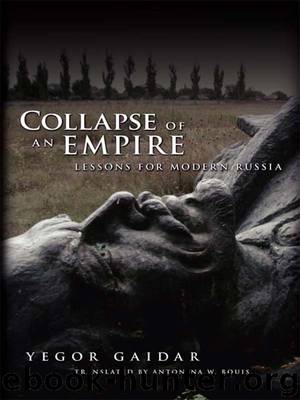Collapse of an Empire: Lessons for Modern Russia by Gaidar Yegor

Author:Gaidar, Yegor
Language: eng
Format: epub
Publisher: Brookings Institution Press
Published: 2007-04-10T04:00:00+00:00
Loss of Control over the Economic and Political Situation
In 1989–90, the Union leadership lost even more control over the country’s fate. The mounting economic difficulties, the shortages in the consumer market, and the expanding list of items that were available only through rationing undermined the legitimacy of the regime and ensured mass support for anti-Communist agitation. This sentiment was particularly evident in the capitals, Moscow and Leningrad, and in the large cities. Secretary of the Central Committee Vadim Medvedev described the political results of the first semi-free elections, which took place in the spring of 1989: “In the course of the elections to the Congress of People’s Deputies of the USSR, 32 of the 160 first secretaries of regional party committees lost…. In Leningrad, not a single Party or Soviet leader of the city and region was elected, not a single member of the bureau of the regional committee, including the first secretary and even the commander of the military okrug (district). In Moscow, most Party workers lost, and 90 percent of Muscovites voted for Yeltsin.”28 Party leaders lost in the Volga region, in the Urals, Siberia, the Far East, southeastern Ukraine, the Baltics, Armenia, and Georgia.
Crime was increasing. In the first half of 1990, 1,514,000 crimes were reported in the Soviet Union, 251,000 more than in the same period a year earlier. Crimes involving guns had gone up by almost a third. The number of robberies was growing rapidly.29 The state was losing its ability to ensure law and order.
The formality of electing directors and switching from the state plan to state commissions while keeping strict political control would merely have perpetuated the system of administrative control of the economy. Instead, the weakening of the regime made it possible for enterprises to exercise greater independence. Managers could ignore directives from the authorities. But the retention of fixed prices for products of state enterprises and free products produced by co-operative enterprises created the conditions for a massive semilegal redistribution of resources into private hands.
Contradictory decisions by Union, republic, oblast, and local authorities gave the enterprises freedom to maneuver. The fundamental trait of the socialist economy was manifest yet again: it can work only under a harsh political regime, and without this, it falls apart.
The resolution of the Congress of People’s Deputies of June 9, 1989, demonstrates the unique nature of a society that did not have the experience of democracy but was no longer ruled by an authoritarian regime. It notes the problems related to the disarray of the financial system, the unbalanced market, and the shortages of consumer goods and services. After stating this, the authors nevertheless propose an immediate rise in minimal pensions for the elderly, an increase in pensions for the most severely disabled, an end to the limits on pensions for all pensioners and invalids working in agriculture, no matter their wages, and so on.30
The weakening of power and loss of political control gave rise to competition among Union and republican administrations to see who could do more to destroy the fiscal system of the USSR.
Download
This site does not store any files on its server. We only index and link to content provided by other sites. Please contact the content providers to delete copyright contents if any and email us, we'll remove relevant links or contents immediately.
| Anthropology | Archaeology |
| Philosophy | Politics & Government |
| Social Sciences | Sociology |
| Women's Studies |
The Secret History by Donna Tartt(19052)
The Social Justice Warrior Handbook by Lisa De Pasquale(12187)
Thirteen Reasons Why by Jay Asher(8893)
This Is How You Lose Her by Junot Diaz(6877)
Weapons of Math Destruction by Cathy O'Neil(6264)
Zero to One by Peter Thiel(5786)
Beartown by Fredrik Backman(5737)
The Myth of the Strong Leader by Archie Brown(5499)
The Fire Next Time by James Baldwin(5431)
How Democracies Die by Steven Levitsky & Daniel Ziblatt(5215)
Promise Me, Dad by Joe Biden(5141)
Stone's Rules by Roger Stone(5081)
A Higher Loyalty: Truth, Lies, and Leadership by James Comey(4954)
100 Deadly Skills by Clint Emerson(4921)
Rise and Kill First by Ronen Bergman(4779)
Secrecy World by Jake Bernstein(4741)
The David Icke Guide to the Global Conspiracy (and how to end it) by David Icke(4701)
The Farm by Tom Rob Smith(4502)
The Doomsday Machine by Daniel Ellsberg(4484)
